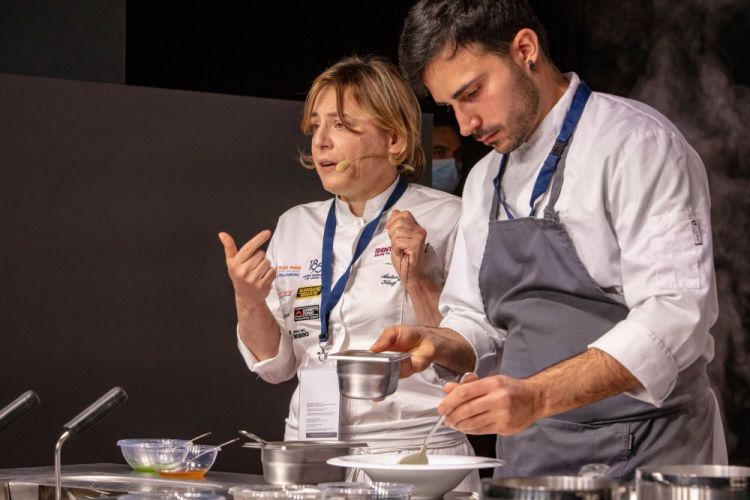Friday the 22nd of April, second day of Identità Milano 2022. On a morning that started with the inevitable blast caused by Carlo Cracco's presence, the second guest arrives in a coherent flow at the Auditorium. During a talk moderated by Gabriele Zanatta, Antonia Klugmann, patron chef at L’Argine a Vencò, in Friuli, is a concentrate of grace. Where grace coexists with the power of a very precise message, sustainability oozing from every word she says, a gentle vision of cuisine and its protagonists. Ingredients.
With this gentleness and a fascinating storytelling thanks to both rhythm and content, chef Klugmann shares a lesson where special effects are banned, and only the interpretation of ingredients is allowed. Two dishes, Cozze and Cannelloni. «I feel privileged to live in such a unique time. We've all focused our attention on the environment. Regardless of your profession, for us chefs it must be more than an obligation».
We are in awe of the philosophy of
Klugmann, every thought of hers finds a real meaning in the dishes, «or else it would be just empty talking». Respect for the environment, but also for guests whom they hand truth and coherence, even before taste.
Back to the dishes, Cozze has been for one year in the menu at Vencò, and represents a product that she considers extraordinary in terms of beauty and complexity. The mussels come from some farms in Trieste, and we discover that these farms differ in terms of sapidity, of size. There are endless nuances in a common ingredient. To make the dish, the mussels are opened quickly (no sauté, but with a touch of helichrysum that gives a note of liquorice) and served with a cream of clams and lupini clams, mixed only with some extra virgin olive oil and water once the mussels are open. She finishes the dish with a juice of bieta da taglio (very different from the usual Swiss chards), a herb that grows fast, is sweet, mineral, and mixes well with the other juice, made with friggitelli peppers. Finally, leaves of lightly seared bieta.

What is the message behind this dish? On top of the intensity of the sea, it shows some Italian products and, one should say, some of the most common and cheapest Italian products too. «It is a known fact that I've banned from my kitchen ingredients like foie gras, caviar, lobster, and products that cannot be found in Vencò. And I believe the ego of the cook cannot stand above the environment».
Creativity and many ideas that should be taught in schools. For instance, the theme of wilderness, very dear to
Klugmann. Wild herbs must be observed, recognised, but one should only pick the most common ones, the weeds of which there's abundance and can reproduce fast. This is real sustainability, people should not cause damage. The same applies to sustainable fishing, and to the choice of non-intensive meat farming.
Antonia Klugmann recently started to work in partnership with the
WWF. An inevitable connection.
«These have been complicated years. I worked and analysed creativity. I felt useless and as never before I feel the need to be proactive».
Antonia Klugmann is not a Marie Antoinette in her luxury castle, but a chef who founds everything on sensitivity. She lightens up when she talks of seeds, the ones she toasts and uses as crucial aromatic ingredients in her dishes, and, what with one detail and the other, we get to the second dish:
Cannelloni.
The challenge of
primi piatti, for an Italian, is doing something original.
Klugmann's
Cannelloni enclose all the herbaceous components of the countryside, sublimated through the palate. We start with a broth, an infusion of nettles and red dead nettles. A fast cannellone, almost transparent, that perfectly follows the sustainable philosophy of the restaurant. Zero waste: if there are left over egg whites, they'll use them to make the pasta, instead of the yolk. The result is a very, very thin pasta, transparent, which doesn't hide the aesthetic filling made with chicory, garlic and ricotta.
Ricotta di Cividale, from a small local producer. The exterior is glazed with an infusion which is now a sauce of forest and nettles, while the tasting promises pure bitter sensations, very few fats, and a very quick cooking. «I'm happy that my guests are understand the economic value of a dish like this one». Indeed, when analysing it, the most expensive ingredient is ricotta, then there's labour, and finally the energy to make the dish. A completely different approach to cooking. In summary, this is what the work of a cook should really be like. Thank you, Antonia.
Translated into English by Slawka G. Scarso